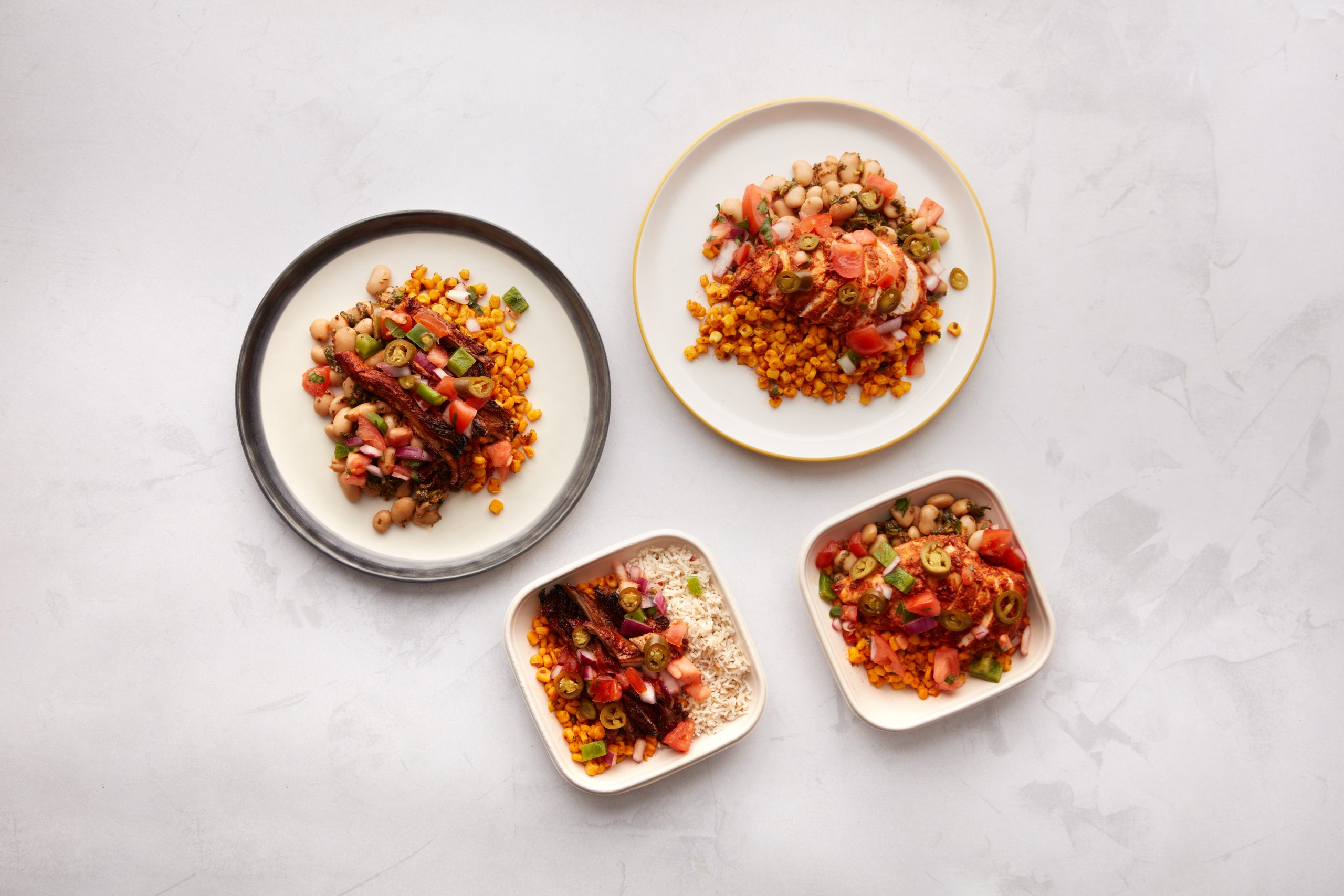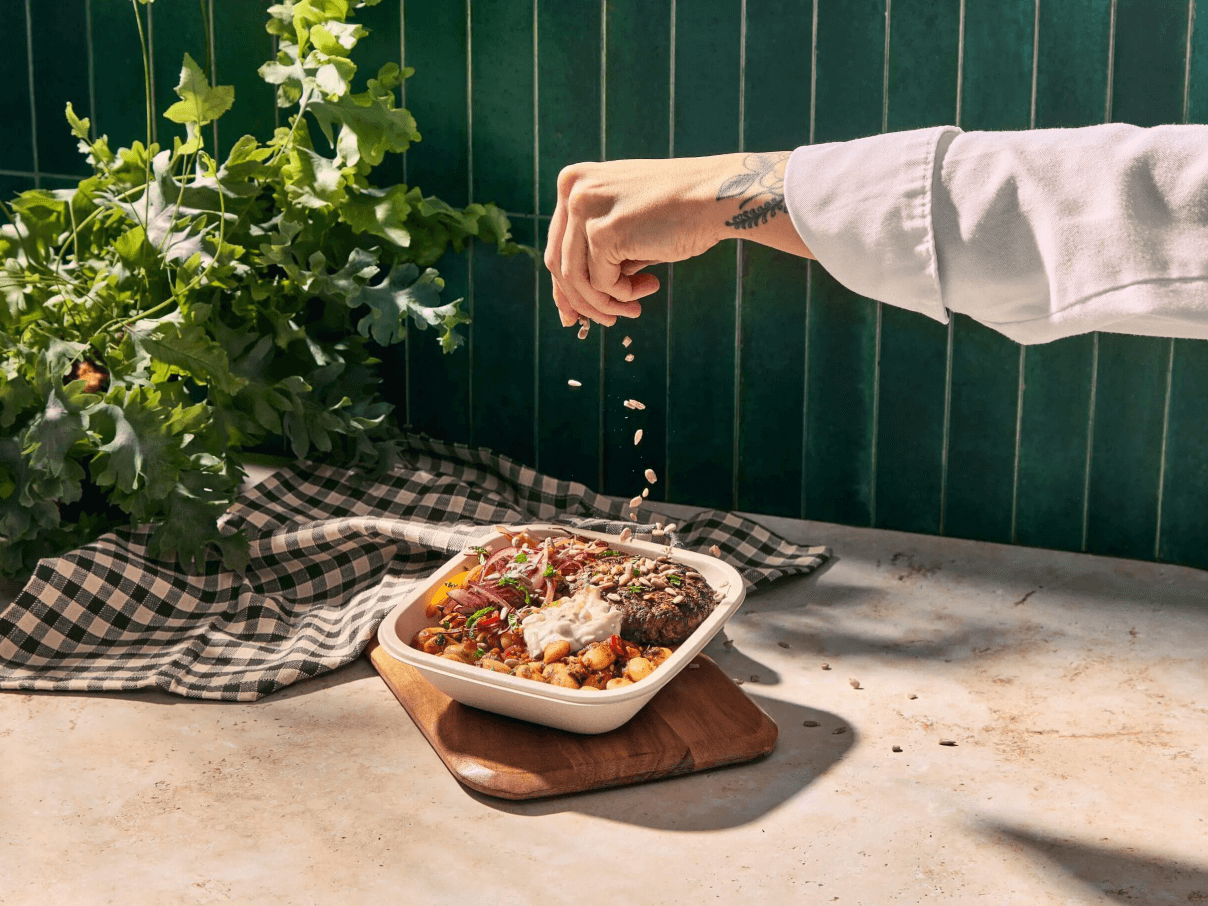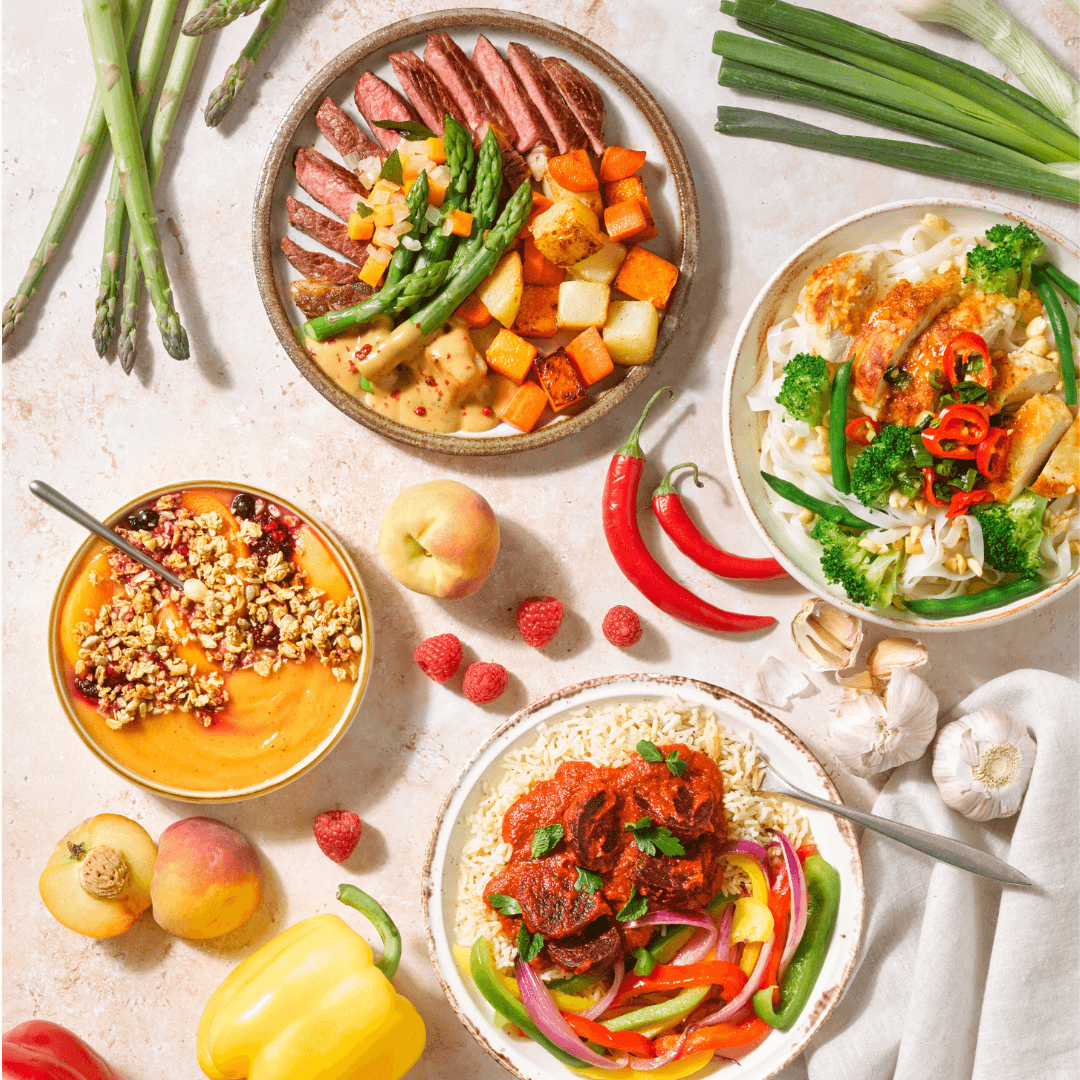Meal prepping, or batch cooking, has become a go-to for cooking convenient, nutritious meals at home. Whether you're hitting fitness goals, saving money, or avoiding midweek takeaways, prepping ahead can save time, cash, and stress.
With 73% of people using meal prep to free up their week and 60% relying on it for healthier eating, keeping meals fresh is key. So, how do you ensure your Sunday prep is still delicious by Wednesday?
We’re uncovering the secrets of meal prep storage, from fridge to freezer. Learn how to keep food fresh, avoid common mistakes, and even upgrade your prep with Frive's chef-made meals, no batch cooking required!
How long does meal prep last?
The lifespan of your meal prep depends on what's in the box. Various food types have different storage limits, and knowing how long they last can help you avoid wasted meals, questionable leftovers and getting ill. Here's a breakdown of how long meal-prepped foods typically stay fresh, whether in the fridge or the freezer.
| Food Type | Fridge | Freezer |
|---|---|---|
| Cooked proteins | 3-4 days | Up to 3 months |
| Cooked grains | 3-5 days | Up to 3 months |
| Cooked vegetables | 3-5 days | 8-12 months |
| Dairy-based meals | 1-2 days | Not recommended |
| Seafood | 2-4 days | 2-3 months |
| Salads | Up to 5 days | Not recommended |
Cooked proteins
Cooked proteins like chicken, beef or pork are meal prep staples that last 3-4 days in the fridge when stored correctly in airtight containers. For an even longer shelf life, you can freeze them for up to 3 months.
Prepping grilled chicken for salads or roasted beef for sandwiches? Store them separately to avoid soggy bread or wilted greens.
Seafood is slightly more tricky, with cooked seafood lasting 2-4 days in the fridge. If you’re batch-cooking salmon or prawns, freeze portions you won’t eat within that time to maintain freshness and avoid accidental cases of food poisoning.
Cooked grains
Grains like quinoa, rice and pasta hold up well for 3-5 days in the fridge. They also freeze equally well, staying fresh for up to 3 months. Cool your grains quickly and store them in single-serving portions to prevent clumping. Add a splash of water to restore moisture when you're reheating.
Cooked vegetables
Roasted or steamed veggies are great for meal prep, staying fresh in the fridge for 3-5 days. In the freezer, they last even longer, up to 8-12 months, though their texture may change and soften slightly.
Dairy-based meals
Meals featuring dairy, like yoghurt-based salad dressings or creamy pasta sauces, should be consumed within 1-2 days. Dairy doesn’t freeze well and tends to separate when thawed, compromising texture and taste. If you’re making a creamy curry, portion it out and plan to eat it early in the first part of the week.
How long does meal prep last in the fridge?
Most meal-prepped foods can last anywhere between 3 to 5 days in the fridge as long as they're stored at or below 4°C. However, it all depends on the ingredients you've used. While this relatively short time frame ensures your meals stay fresh and safe to eat, it also requires some strategic planning to ensure you get through your meals before they spoil.
Invest in airtight containers to extend the fridge life of your meals and keep odours from mingling. Label your meals with preparation dates so you know exactly what they contain and when to eat them.
How long does meal prep last in the freezer?
Freezing is a game-changer for long-term meal storage, with properly frozen meals lasting up to 3 months while retaining both flavour and nutrients. However, not all foods are suitable for freezing. When batch-cooking, ensure your meals have cooled completely (ideally within 1 to 2 hours) before freezing.
Use freezer-safe containers or bags, and label each meal with the date it was prepped. When ready to eat, thaw meals in the fridge overnight for safe reheating. While it may take a while, it ensures your meals stay safe.

Tips for maximising meal prep freshness
The key to successful meal prep isn’t just about cooking in advance, it’s about keeping your meals fresh and safe for as long as possible. With the right techniques and tools, your food can stay just as delicious and nutritious throughout the week as the day you cooked it.
Use airtight containers
Airtight containers are your best friends when it comes to preserving freshness, helping to slow down bacterial growth and prevent oxidation, which can lead to spoilage.
- - Glass jars: Perfect for soups and sauces.
- - Plastic containers: Ideal for proteins and grains.
- - Mason jars: Great for keeping salads and dressings crisp and separate until you’re ready to eat.
Avoid using containers that are too large for your portions, as excess air can cause food to spoil faster.
Let food cool before storing
Storing hot food might seem like a time-saver, but it’s a recipe for soggy meals and bacterial growth.
Let your food cool for at least 30 minutes before sealing it to prevent condensation inside the container and keep the delicious textures intact. Just don’t leave food out for too long either, bacteria are everywhere, so you want to place your meal in the fridge within 2 hours to keep it safe and prevent bacteria from reproducing.
Store meals strategically in the fridge
Where you place your meal prep in the fridge matters:
- - Avoid the fridge door: This area is exposed to fluctuating temperatures, making it a poor choice for perishable items.
- - Bottom shelves: These are typically the coldest and best for storing meal prep.
- - Top shelves: Use for less perishable items like eggs or condiments.
- - Whole root vegetables like carrots and parsnips: Stay fresh for up to three weeks.
- - Chopped fruits like berries and bananas: Store in the freezer for smoothies and snacks for up to six months.
An overcrowded fridge can also block airflow, leading to uneven cooling, so keep things organised to maintain a steady temperature throughout.
Keep foods whole
Chopping fruits and vegetables causes stress on their cell tissues and speeds up their degradation, which is why they tend to wilt or quickly go brown. Instead, store them whole and slice them as needed. Whole produce generally lasts longer and retains more nutrients.
Label everything
Labelling is a simple but effective way to keep track of your meals. Include the prep date and a brief description of the contents to prevent those “mystery container” moments and help you prioritise what to eat first.
Consider a meal prep subscription plan
A meal prep subscription plan is the perfect solution if you want to enjoy fresh, healthy meals without the prep, that’s where Frive comes in.
Frive’s chef-made meals are delivered fresh twice weekly (Wednesdays and Sundays) and are made with high-quality ingredients (no ultra-processed ingredients used) tailored to your dietary needs, giving you all the convenience of meal prep without the hassle. All you need to do is pop it in the microwave.
So, let Frive take care of it all so you can focus on enjoying delicious, high-protein, vegan or calorie-controlled healthy meals without lifting a finger. Plus, with a new menu every week, you’ll never get bored.
Master your freezer
The freezer is a meal prep lifesaver, and properly stored meals can last up to three months. Use freezer-safe bags or airtight, reusable containers and remove as much air as possible to prevent freezer burn. When you’re ready to eat, thaw your meals in the fridge overnight and consume them within 24 hours for maximum freshness.
Avoid cross-contamination
Cross-contamination can ruin your meal prep, not to mention that it can also make you extremely unwell. Keep raw and cooked ingredients separate, and always wash your hands, utensils and cutting boards thoroughly to prevent harmful bacteria from being transferred and resulting in mild to severe foodborne illnesses.

Frive meals are delivered twice weekly. Just heat and eat, it’s that simple. Shop now.
Common meal prep mistakes to avoid
Meal prep can be a game-changer, but even the best plans can fall flat. These common pitfalls can shorten the lifespan of your meals, leading to wasted food (not to mention all your strenuous efforts). Here’s what to watch out for when prepping your meals to keep them fresh, safe and satisfying.
1. Storing meals in the wrong type of container
Not all containers are created equal, and using the wrong type can lead to leaks, spoilage or even freezer burn.
The fix: Invest in high-quality, airtight containers, like fridge and freezer-safe glass for liquids like soups, plastic for proteins and grains and mason jars for portioned salads or snacks.
2. Not refrigerating or freezing meals quickly enough
Did you know that bacteria responsible for food poisoning, like E. coli and Salmonella, grow best at room temperatures between 5°C and 60°C? That’s why leaving food out for too long before storing it is a fast track to spoilage and a wide range of unpleasant and potentially severe digestive issues.
The fix: Allow food to cool for about 30 minutes, then seal and refrigerate or freeze promptly. Never leave perishable foods out for more than two hours.
3. Overloading your fridge
Stuffing your fridge to the brim might seem efficient, but it can cause uneven cooling, and without proper air circulation, some meals may not stay as cold as they should, leading to faster spoilage.
The fix: Keep your fridge organised and avoid stacking too many containers. Place meal prep items on the lower shelves, where temperatures are consistently cooler.
4. Using ingredients that spoil quickly without proper storage
There's no denying that certain ingredients like fresh herbs, avocados and berries are delicious, but they're also delicate and, if not stored correctly, can spoil in just a day or two.
The fix: Store these ingredients separately and add them just before serving. For example, keep herbs wrapped in a damp paper towel or store berries in a breathable container to extend their freshness.
5. Failing to label your meals
Forgetting to label your containers might not seem like a big deal until you’re staring at an unidentifiable dish, wondering if it’s still safe to eat.
The fix: Label every container with the prep date and ingredients to help you prioritise what to eat first and prevent unnecessary waste.
6. Not reheating your meals properly before eating
Reheating your meal may seem straightforward, but doing it incorrectly can affect safety and taste. While reheating food kills bacteria in most cases, it won't always destroy the toxins they've created, with every reheat increasing the risk of food poisoning.
The fix: Reheat your meals to an internal temperature of 75°C. Stir halfway through, cover your food to ensure even heating and use a food thermometer to check your meals have reached the correct temperature.
Stay fresh with Frive, the ultimate meal prep solution
Meal prep can save time, promote healthier eating, and keep your week stress-free. By knowing how long meals last and using proper storage, you can ensure they stay fresh and delicious. Cooked proteins last 3-4 days in the fridge, while grains and veggies can be frozen for months.
If meal prep feels overwhelming, Frive makes it simple. With fresh, chef-made meals delivered twice a week, you enjoy all the benefits without the effort.
Made from the freshest ingredients, our meals contain absolutely no artificial additives or ultra-processed ingredients and require no prep or cleanup. Just heat and eat. It’s that simple. Don't just take our word for it, Frive's Trustpilot reviews speak for themselves:
“Best food in terms of overall quality, variety and size by far. Tried a few but the reward incentives, timely deliveries, and rare mistakes make it dominate the U.K. meal prep service industry.” - RL
“The food is very good quality, it’s the only meal prep type food that I have tried so far that actually feels like a wholesome home-cooked meal” - JB
“These are the most tasty, preservative-free, healthy meals we have ever had. Having tried lots of other meal prep boxes FRIVE is the one we have stuck with for close to 6 months. Five balanced main meals per week is our plan. Thanks to the FRIVE chefs the great menu choices” - LH
Ready to ditch the hassle? Explore Frive's menu for a convenient, energising way to fuel your week!
FAQs
Is it safe to meal prep for 5 days?
Meal prepping for 5 days can be safe if done correctly. Store your meals in airtight containers, refrigerate them at 4 °C or below and always reheat thoroughly before eating.
Can you meal prep chicken for 5 days?
Cooked chicken can last up to 4 days in the fridge, so it’s best to eat it within that time frame. If you want to meal prep chicken for 5 days, freeze portions for the last day and thaw them overnight in the fridge for freshness and safety.
Is meal prep good for 7 days?
Meal prep is generally not recommended for 7 days unless you’re freezing portions. Most refrigerated meals are best consumed within 3-5 days to maintain quality and safety. For more extended storage, freeze meals and thaw them as needed.
How long does meal prep last in the fridge?
Most meal-prepped dishes stay fresh in the fridge for 3–5 days if stored in airtight containers at or below 4°C. For seafood and dairy-based meals, aim to eat within 2–3 days.
How long does cooked chicken last in meal prep?
Cooked chicken typically lasts up to 4 days in the fridge. If you’re prepping for longer, freeze extra portions and defrost them overnight in the fridge for safe use later in the week.
Can you meal prep for a full week safely?
Yes, but you’ll need to freeze some meals. Fresh meals are best eaten within 3–5 days; for a 7-day plan, freeze portions for later in the week and defrost them as needed.
What meals shouldn’t be frozen for meal prep?
Avoid freezing meals with dairy-based sauces, leafy salads, or soft fruits, as they often separate or go soggy when defrosted. Stick to grains, proteins and roasted veg for best results.
What’s the best way to reheat meal-prepped food safely?
Reheat meals to an internal temperature of 75°C. Stir halfway through, cover to retain moisture, and always defrost frozen meals in the fridge overnight before reheating.
How can I keep my meal prep fresh for longer?
Use airtight containers, allow food to cool before storing, label meals with prep dates, and store on the bottom fridge shelf. For even more convenience, Frive meals stay fresher for longer and are delivered twice a week.
Can you freeze cooked rice or pasta for meal prep?
Yes, cooked grains like rice and pasta freeze well for up to 3 months. Cool them quickly, portion individually, and reheat with a splash of water to bring back the texture.



